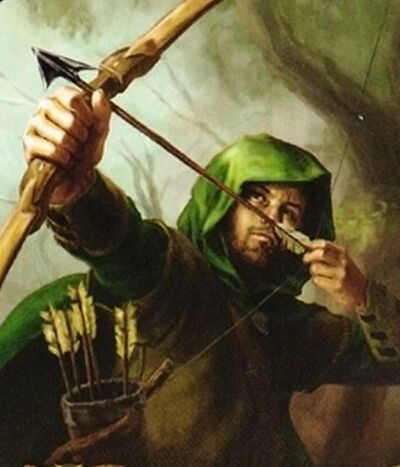
Summary
Faramir is a soldier of Gondor the Lord of the Rings series, he first appears in the book The Two Towers. Faramir was the second son of Denethor II and the younger brother of Boromir. He was the Captain of the Rangers of Ithilien and Captain of the White Tower upon his brother's death.
After the War of the Ring, Faramir became the first Prince of Ithilien and married Éowyn of Rohan.
Powers and Stats
Tier: 9-B
Name: Faramir
Origins: Lord of the Rings
Gender: Male
Age: 28 at the time of the War of the Ring, 82 at time of death
Classification: Human, Dúnedan
Powers and Abilities: Superhuman Physical Characteristics, Weapon Mastery (As a Captain and future Steward of Gondor, Faramir is one of the most skilled warriors of the Kingdom. Eowyn, upon observing Faramir for the first time, claimed that no Rider of Rohan could match him in battle.[1] This would put him above even the likes of Éomer, who was one of only three warriors to come out of The Battle of the Pelennor Fields unscathed in large part due to his might and skill)[2], Longevity (As a Dúnedan of Gondor, Faramir's blessings enabled him to live to the age of 120 years of age before he died of natural causes,[3][4] Moreover, similar to Aragorn and other Faithful Dúnedain/Númenóreans, Faramir likely remained in his physical prime until his death as his kind are capable of relinquishing their lives upon sensing the coming of their physical aging and withering into senility)[5],Blessed (Unlike his brother Boromir, Faramir's Númenórean blessings ran almost true in him, this naturally grants him the presence of several blessings alongside longevity)[6], with the abilities of Enhanced Senses, Empathic Manipulation, Regeneration (Low), Telepathy, and Resistance to Disease Manipulation (Dúnedain/Númenóreans possessed several blessings alongside their enhanced physiques.[7] Faramir is noted to be equal to his father Denethor in this regard, with telepathy being directly noted.[8] Similar to Aragorn, albeit to a lesser degree, Faramir's mere presence is also capable of invoking feelings and emotions within onlookers, with characters such as Sam and Pippin noting the "air" of nobility and "highness" from Faramir)[8][9], Social Influencing (As a Captain of Gondor, Faramir was incredibly beloved, with both "man and beast" in Gondor following his command with discipline.[6] This resulted in soldiers openly upon seeing Faramir downed and unresponsive while Beregond, a Citadel guard of Minas Tirith, would even betray Denethor to try and save Faramir)[6][10], Acausality (Type 2; Changes to the past or future are unable to affect the "Music in being", otherwise referred to as the present)[11]. Resistance to Mind Manipulation (The barrier of Unwill within every individual mind prevents mental penetration by even the likes of Sauron without consent.)[12] and Soul Manipulation (Soul with free-will are considered indestructible)[13]
Speed: Peak Human
Attack Potency: Wall level (Despite being less martially inclined, Faramir should be somewhat comparable to Boromir, as he holds a "greater share" of the Blood of Númenor, which enhances both stature and strength among others things)[8][14]
Lifting Strength: Peak Human
Striking Strength: Wall level
Durability: Wall level (As a captain of Gondor, Faramir should be superior to the Gondorian men at arms like Beregond, who is capable of surviving hits from a "great troll-chief")[15]
Stamina: Peak Human
Range: Extended Melee Range, Tens of Metres with a bow and arrows
Standard Equipment: Sword, bow and arrows
Intelligence: Gifted (One of Gondor's finest captains)
Weaknesses: Normal human weaknesses
Notable Matchups
Victories:
Losses:
Inconclusive:
References
- ↑ The Lord of the Rings: The Return of the King, Book Six, V The Steward and the King
- ↑ The Lord of the Rings: The Return of the King, Book Five, VI The Battle of the Pelennor Fields
- ↑ The Lord of the Rings: Appendix A
- ↑ The Lord of the Rings: Appendix B
- ↑ The Nature of Middle-Earth, Part One: Time and Ageing, IX: TIMESCALES AND RATES OF GROWTH
- ↑ 6.0 6.1 6.2 The Lord of the Rings: The Return of the King, Book Five, IV The Siege of Gondor
- ↑ The Nature of Middle-Earth, Part Three: The World, its Lands, and its Inhabitants, XI Lives of the Númenóreans
- ↑ 8.0 8.1 8.2 The Lord of the Rings: The Return of the King, Book Five, I Minas Tirith
- ↑ The Lord of the Rings: The Two Tower, Book Four, V The Window on the West
- ↑ The Lord of the Rings: The Return of the King, Book Five, VII The Pyre of Denethor
- ↑ Morgoth's Ring: PART FIVE. III.
- ↑ The Nature of Middle-Earth, Part Two: Body, Mind, and Spirit, IX ÓSANWE-KENTA.
- ↑ Letters of Tolkien: Letter 211
- ↑ The Nature of Middle-Earth, Part Two: VI Descriptions of Characters
- ↑ The Lord of the Rings: The Return of the King, Book Five, I Minas Tirith
Discussions
| Discussion threads involving Faramir |